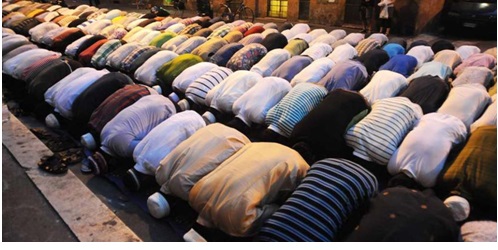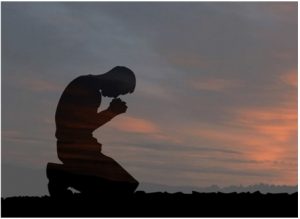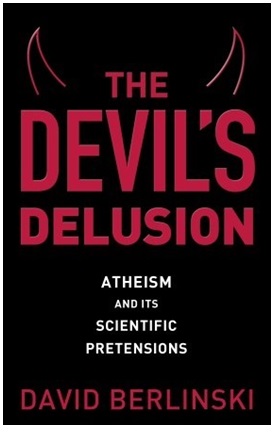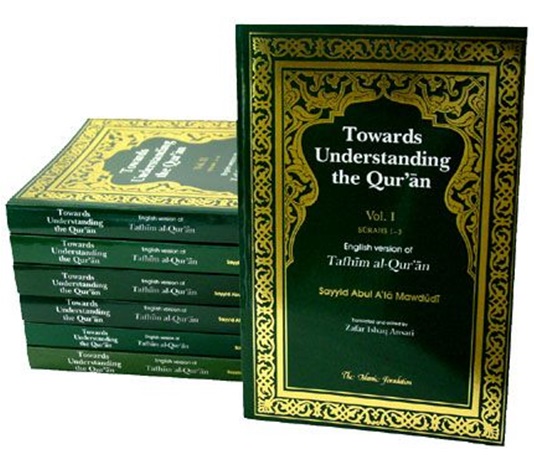Letters to the Editor
Q: I have been reading YMD for a couple of years and find it very informative. My family and I, particularly enjoy and learn from the ‘Questions & Answers’ section as it handles most contemporary issues that the Muslims are facing in India and abroad. I would request you to clarify the matter of wearing Taveez.  Even if you have mentioned this issue in previous articles, please clarify this matter once more.
Even if you have mentioned this issue in previous articles, please clarify this matter once more.
YMD
There is a hadith of the Prophet which says, “Whoever hung something, is bound up to that thing.” The hadith lends several meanings. One is: whosoever hung an amulet to himself, to another, or to an animal, etc., has his destiny depending on it.
Another meaning is that the likely psychological effect on such a person would be that he would begin to depend on that thing, rather than on Allah (swt). Now, to depend on other than Allah (swt), is, a kind of association with Him (Shirk), since all powers rest with Allah (swt), and nothing happens in the universe without His will and approval.
Therefore, most scholars have disapproved of amulets, strings worn in the neck, on the hand, etc.
Q: Some Taveez have parts of the Holy Qur’an in them, while others have Ganj-al-Arsh or any other non-Qur’anic verses. Is there a difference between the validity of these?
YMD
Since amulets themselves have a question mark on them, what is written inside will have a similar question mark. However, if there are words of disbelief, or of association with Allah (swt), then, wearing such amulets would be outright impermissible. Even those who allow, even though half-heartedly Ganj-al-`Arsh, will unhesitatingly say that wearing anything that has words of disbelief, or material from other religious or non-religious scriptures, is unlawful without a second opinion.
Q: Ganj-al-Arsh is supposed to be verses from Allah’s Chair: it is not mentioned in the Qur’an but it is mentioned there in Hadith. Is this true?
YMD
This is a lie and a great sin for those who fasten lies upon Allah (swt) and His Messenger. There is no such thing in the hadith. To be sure, there is not even a fabricated report to this effect. The so-called Ganj-al-`Arsh is an invention dating several centuries after the Prophet. How can it be in the hadith literature?
Q: Some Taveez are made by ‘special holy men,’ while others are made at home (with black clothes, threads and wax). Is there a difference? Can either be used?
YMD
The so-called holy men are hoaxes. They are equivalent of the priestly class… who live on the earnings of the common people. They and the material they offer should be avoided as you would avoid a piece of burning coal on your palm.
Q: Did Prophet Muhammad (saws) do this or advise this practice to his companions or anybody? If there is a form of Taveez that can be used by Muslims, please define the criteria and types, if any.
YMD
No, the Prophet never advised anyone to wear a Ta’weedh (amulet).
Further, there is no need for the Muslims to wear Ta`weedh. A good, practicing Muslim is protected by angels and Allah’s unseen forces. He is further protected by reciting the various supplications that the Prophet recommended for various occasions. One of his hadith says, “Whoever recited (the following) morning and evening is protected from all evils: ‘In the name of One Allah, with whose Name nothing harms in the earth nor in the heavens, and who is the Hearer, the Knower.’”
That is, all that one requires to do, to save himself from the evils of the earth and the heavens, is to say the above words, in full belief, once in the morning, and once in the evening. But, let us say someone doesn’t do his five daily Prayers. Then there is no supplication, and no amulet that can save him from evils.
Q: And, one more doubt, the Imam prays and leads the congregational prayers from a recess or small room at the front of the mosque. Is there anything special in making Dua’ from here or it does not make any difference, our Dua’s carry the same weight whether in the mosque or in the house? Are there any special ‘places’ from where to make Dua’s?
YMD
Supplications after Prayers is not the Sunnah of the Prophet. He did not make supplication, after the Prayers, in congregation, as is done by the Imam in many parts of the world today.
 As for which is the best place for supplications, the answer is, there is no special place for making supplications, except of course the Sha’aa’ir-Allah (the holy sites in Makkah). However, there are special times when supplications are more likely to be heard and answered, such as, after a good deed, after charity, during the last third part of the night, after ‘Asr Prayers until Maghrib, between Adhan and Iqamah, in the battle-field, etc.
As for which is the best place for supplications, the answer is, there is no special place for making supplications, except of course the Sha’aa’ir-Allah (the holy sites in Makkah). However, there are special times when supplications are more likely to be heard and answered, such as, after a good deed, after charity, during the last third part of the night, after ‘Asr Prayers until Maghrib, between Adhan and Iqamah, in the battle-field, etc.
Q: Many people say that there are around two million Ahadith and only a scholar who has studied ‘all’ of these can comment on the Islamic validity of Taveez, Ganj-al-Arsh and places for Dua’s.
Syed K.,
On Email
YMD
This is a clever Satanic ploy to gain legitimacy for wrongful deeds in the name of Islam. The number of ahadith does not go to two million. Depending on how you count, (whether or not variations in the wordings, or in the narrators, will be left out), there are no more than 100,000 trustworthy ahadith, no matter how you count. And, there are many people around who know all of them. That is, when a hadith is mentioned before them, they can say with quite some certainty whether it is a Prophetic statement or not. Indeed, there are scholars who can do a little more than that. When offered a report, they can even say if it is trustworthy or not. In other words, not only they know the trustworthy reports, but also untrustworthy ones.
Nevertheless, in our times, we need not depend on such scholars, especially when the thriving, professional priestly class of Islam, has planted doubts about the trustworthy scholars. Anyone, therefore, who does not trust the hadith scholars, can easily look into the written works and search for the ahadith about Ganj al-`Arsh and other such reports.
In fact, the task has now become much easier. There are hadith computer programs that have recorded every single hadith work in the electronic media. One of them, produced by Al-`Arees, is so big, (since it includes every book of hadith, and more), that it comes in three CDs. In addition, there are Internet sites that offer ahadith collections. For e.g., an Internet site called “Al-Muhaddith” has every thinkable hadith book posted on its site, which can be downloaded by anyone, at no cost, with the click of a mouse: All he needs is good space in his hard disk.
But, the problem is, neither those who claim that there are two million ahadith, nor those who believe in their statements, can make use of these computer programs or Internet sites. Why? Because, they do not know the Arabic language. Even the so-called top class holy men, the chief of chiefs, hardly know enough Arabic to be able to understand a hadith wholly, if offered in Arabic. It is another thing that they cleverly hide this fact from the masses, and act as if they are experts in the Arabic language. But the scholars know where they stand.
Instead of making false claims of the sort they make, should they not post the collection of those ahadith on the Internet? After all, are they not operating several Internet sites, where they can post the ahadith you have mentioned?
Interestingly, several Internet sites that are owned by the people in question, do not have a single hadith book posted on their site. Any explanation from the lovers of the Prophet?
Q: I will always be indebted to you for keeping me away from Bid’a and Shirk and all the evils in our society. YMD has helped me immensely in following right beliefs. I have some doubts regarding the following points. This will be of great help for me if you clear my doubts. Is there any mention of Dua’ Yaseen being recited after Surah Yaseen in Prophet’s (saws) traditions?
YMD
There is no hadith which recommends a particular Du`a to be recited after Surah Yasin, or any other Surah, or even after the recitation of the Qur’an.
Q: Are references cited pertaining to Ahadnama?
YMD
We do not know what this Ahadnama is.
Q: Will ablution be still valid after clipping nails, trimming moustache or beard?
YMD
No, ablution would be nullified.
Q: Is it necessary to change place after Fard prayers?
YMD
It is not absolutely necessary to change places after the termination of obligatory Prayers. It is only preferable. However, more preferable is to do the Sunnah at home which was the practice of the Prophet and his Companions.
Q: Can dua’ be made after each Sunnah and Nafil prayers – or only after Fard prayers?
YMD
 Supplications can be made at any time, especially after every good act. Therefore, they can be made after the obligatory Prayers, as well as after every Sunnah or Nafil Prayers. However, the recommended way would be not to spend a lot of time in supplications, especially if it is at the cost of recitation of the Qur’an, or study of hadith, etc.
Supplications can be made at any time, especially after every good act. Therefore, they can be made after the obligatory Prayers, as well as after every Sunnah or Nafil Prayers. However, the recommended way would be not to spend a lot of time in supplications, especially if it is at the cost of recitation of the Qur’an, or study of hadith, etc.
One may – especially if he is young – devote more time to study of religious texts than he would to supplications. But, if someone is already devoted to studies, and still has time to make frequent and long supplications, then he might do it.
Q: Can we start ablution after Adhan has started?
YMD
Yes, why not?
Q: Can we answer to Adhan while making ablution?
YMD
Yes, you can.
Q: Should we also say Darud while replying to Adhan‘s ‘Ashhaduanna Muhammad arRasoolullah’?
YMD
The Sunnah is to repeat the adhan words with the muedhdhin. Nevertheless, there is nothing wrong in reciting the peace formula, after the words of the muedhdhin“ I bear witness that Muhammad is a Messenger of Allah.”
Q: Is dua after Fard Salah with Imam in congregation Bid`ah?
YMD
Muhammad Shafi` Deobandi, the former Hanafiyy Mufti of Pakistan has written in his “Jawahirul Fiqh” that the Prophet did not make congregational supplication after the obligatory Prayers with the Companions behind saying Ameen.
The Prophet used to turn to the congregation facing them, after his Salam. He stayed for a while doing his personal adhkaar, saying supplicatory words, and then got up and went home. He did not even supplicate for himself with raised hands after the Prayers.
Q: During my childhood I stole some things. I have decided to spend a certain amount of money as charity in the names of the persons I stole from, so that I am not questioned on the final day. I also wish to avoid confessing before them. Is this enough?
YMD
If it had happened when you were really a child, then there is nothing for you to do, unless the goods were very expensive and the owners have suffered on that account. If such is the case you might try to recompense them – preferably in cash – giving it over as gift. You are not bound to do this, and hence, if you did, it will be treated as charity from you.
But, if you did it after you became conscious of right and wrong, although not yet of age, then also you try to compensate the owners, unless those were petty insubstantial things. However, this is not absolutely binding on you either. That is, if you are able, you will do, and if not, then Allah might forgive it if you are repentant.
But if you were fully mature, and well aware of the nature of the acts, then you are required to restore people’s properties whenever you can. Once again, the restoration can be in cash and given as gift.
In no case is your expenditure on others, on behalf of those you wronged, is justified.
Q: I keep a beard. I miss (only) my Fajr prayers but regularly listen to film songs. People around me say I am a hypocrite. They say I should remove my beard and cap. How am I to react (to these people)?
By Anonymous,
On Email
YMD
The people’s suspicion about hypocrisy might have some, but not strong, grounds. On the other hand, the suggestion they offer has no ground whatsoever.
Q: According to science there are 90 vestigial organs in our body e.g., external pinna, ver. appendix, coccygial bones etc., but we are told in the Qur’an that Allah (swt) has created nothing useless. Please justify.
YMD
According to science, humans themselves are vestigial: their opinion is that they are beings who have no function; their being in the universe or not being, is just the same. This explains why they make ever more destructive bombs, and their leaders threaten that they will nuke this people or that people… instead of getting civilized, and allow them peacefully siphon out oil equivalent to the cost of the war, plus some profit. No scientist protests the use of terrible destruction against hapless men, women and children of Iraq.
It is important to keep this in background. We have to know what to expect from a quarter which is morally bankrupt.
As for theory concerning 90 vestigial organs, it is little more than scientific humbug. It is not worth taken serious. Nevertheless, since some sort of answer is expected from the Islamists, let us, in the same spirit, that is, taking it lightly, tell the scientists that this is only a theory, and so, of no importance. After all, science and scientists have been carrying several theories in their bags – just as the magician’s bag – since past few decades without any progress. So, we pay no undue attention to a theory, except that when we do, we ask the scientist to convert it into a fact, or see his way out, along with his bag, which has begun to stink.
But one of them might protest and say, “If it was a mere theory without good amount of data in its support, we wouldn’t be discussing it.” So, let us assume the vestigial theory is very close to a fact, or almost a fact, as the Evolutionary Theory they claim is.
 If this is the situation, we suggest the following as treatment for this madness. Get a volunteer scientist. (Scientists are known for heroically experimenting first on themselves). Having found one, let us remove all his 90 vestigial organs.
If this is the situation, we suggest the following as treatment for this madness. Get a volunteer scientist. (Scientists are known for heroically experimenting first on themselves). Having found one, let us remove all his 90 vestigial organs.
The volunteer might say, “OK. Here I am. Do the experiments on me. To start with, remove my appendix.”
We say no to this method, out of mercy to him, because, following the method he suggests, (we are sure he is guileless), he will have to undergo 90 operations. Opening up his body 90 times will surely kill him. So, let him get rid of 90 vestigial organs in one shot. What will remain of him will help us distinguish between theories and facts.
Now, let us team up and look for a volunteer. Next time somebody talks about vestigial theory, tell him we are looking for a volunteer.
Q: Is the reading of daily newspapers, most of which have obscene pictures, allowed for a Muslim, keeping in view the competitive educational needs of students?
YMD
You could not have put the need for Muslim press on Islamic rules more eloquently.
As for competitive educational needs, could those Muslims who fail their tests so often, and in such large numbers, be sharing this idea? Competitiveness comes from study of hard core text books. Where one is prescribed, you study two others.
Q: I am very depressed in my life because of my father who sells liquor and indulges in other unethical practices. My mother is quite pious. Please tell me what should I do?
Abdul Munaf,
On Email
YMD
You should speak to some of the Da`wah workers in your neighborhood to try and change your father.
We have removed much of your letter detailing the problems; in view of which we might remind you that your responsibility concerning yourself is greater. Are you developing your own self? This should worry you more than your father, who is, after all, answerable for himself. Your present worries should not detract you from improving your own personality all around. Your father – undeniably an important figure for you at this age – is, after all not your life-partner. It is your inner self, the person within.
Q: Please enlighten us whether Prophet (saws) wore any of his clothes below ankle level? If no, then is it not a Sunnah worthy to be emulated and followed by Muslims in general?
YMD
Of course, it is a Sunnah worthy of practice. However, the following maybe kept in mind: cloth-dragging was a fashion of the rich and the aristocrats of the Prophet’s time. If nothing, it was a sign of pride. And pride is intolerable in Islam. Further, Muslims fought in the clothes they normally wore. Could they successfully fight with their lower garments, sometimes a piece of cloth woven around the waist, trailing behind them by a foot? Hence, most scholars have suggested that the ban on trousers below the ankle applies when it is out of pride. Interestingly, when they say trousers, the Muslims mean pyjamas, lungis, and other eastern attires. Somehow, these clothes have stuck in their minds as associated with the prohibition. So that, many of them (including the most religious) who wear dresses other than eastern, such as pantaloons, or night pyjamas, tend to forget the commandment as they understand and preach.
Q: Maulana Maududi, in his Tafheemul Qur’an and other works has made quite a lot of mistakes in his interpretation of religious texts. Some of them can be considered as blunders of a monumental nature, not befitting a person of his  learning and stature. If necessary, I can send you those books and literature with the mistakes highlighted.
learning and stature. If necessary, I can send you those books and literature with the mistakes highlighted.
YMD
Please do that. It will help us know what those ideas of Mawdudi are those that trouble the people. Nonetheless, we might point out that to err is written in the fate of the humans. Scholars also commit errors. There is none of the past or present who has not. So did Mawlana Mawdudi. And so have you. To say that Mawlana Mawdudi committed “lots of mistakes” is a mistake. And to say that he committed “monumental errors” is a monumental error by itself.
Q: Do you advise Muslims to read his works and literature? Is it not possible that reading his interpretations may mislead many?
YMD
Yes, we advise Muslims to read his works. That advice, indeed, has now assumed greater emphasis. For, new writers of his class are not around and his message – in essence an enlightening, inspiring and a bold one – seems already suffering negligence and sliding towards oblivion.
What we discourage is a blind following of anyone: whoever it might be after the Prophet. Blind following narrows down the mind and  leads to a rigidity disfavoured in Islam. Blind following, unless it be in Law which is highly complicated for one to work out by himself, also creates a dormant mind incapable of moving forward on its own. That is a chronic disease today in much of the Islamic world.
leads to a rigidity disfavoured in Islam. Blind following, unless it be in Law which is highly complicated for one to work out by himself, also creates a dormant mind incapable of moving forward on its own. That is a chronic disease today in much of the Islamic world.
Most callers of Islam today, even those who favour the abandonment of the four schools of Fiqh are, in actual fact, callers to blind following. They only wish to remove some and replace them with others that might be blindly followed. This is the reason why this Ummah is intellectually stuck in the sands today.
That is what happened to some of those who read no other author but Mawlana Mawdudi. They hung on fast to the rope he threw down for them from the top of the mountain. They caught it, but didn’t climb. And that is what we warn against, and not against his writings whose electrifying nature is indisputable.
Q: Please advise us as to how we should separate the chaff from the grain, if a Muslim wishes to go ahead and still wants to read his literature?
Tariq Siddiqui,
Falak Numa, Hyderabad
YMD
Since removal of the chaff from the grain cannot be done following a simple advice, what you are asking us to do becomes a difficult proposition. How can “you” read, and, as “you” read on, “we” separate out the chaff from the grain?! Nevertheless, the difficulty should not be a discouraging factor.
What you can do is to read all his books, and, side by side by others such as, for e.g., those of Manazir Ahsan Geelani, Shibli No`mani, Syed Sulayman Nadwi, Abul Hasan Ali Nadwi, and others of that class. You will notice some differences. Most of them you might be able to reconcile yourself as you keep on studying. It is only a few unresolved questions that you will be left with in the end. To resolve them you will require discussions with the scholars or a searching study of the religious texts. But, given the nature of differences, one need not throw away the grain from the fear of unnoticeable chaff.

